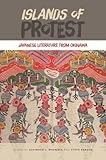Islands of Protest : Japanese Literature from Okinawa / ed. by Davinder L. Bhowmik, Steve Rabson.
Material type: TextPublisher: Honolulu : University of Hawaii Press, [2016]Copyright date: ©2016Description: 1 online resource (304 p.)Content type:
TextPublisher: Honolulu : University of Hawaii Press, [2016]Copyright date: ©2016Description: 1 online resource (304 p.)Content type: - 9780824839802
- 9780824858261
- 820
- PL886.O52
- online - DeGruyter
- Issued also in print.
| Item type | Current library | Call number | URL | Status | Notes | Barcode | |
|---|---|---|---|---|---|---|---|
 eBook
eBook
|
Biblioteca "Angelicum" Pont. Univ. S.Tommaso d'Aquino Nuvola online | online - DeGruyter (Browse shelf(Opens below)) | Online access | Not for loan (Accesso limitato) | Accesso per gli utenti autorizzati / Access for authorized users | (dgr)9780824858261 |
Frontmatter -- Contents -- Introduction -- FICTION -- Hope (1999) -- The Kunenbo Orange Trees (1911) -- Black Diamonds (1949) -- Taiwan Woman -- Tree of Butterflies (2000) -- Island Confinement (1990) -- Swaying, Swinging (2003) -- POETRY -- Backbone (2005) -- Inner Words (2001) -- White Ryukyuan Tombs -- Okinawa! Where Will You Go Now? (1964) -- DRAMA -- The Human Pavilion (1978) -- Contributors
restricted access online access with authorization star
http://purl.org/coar/access_right/c_16ec
Literature is an important vehicle to further knowledge of other cultures, and English translations of Okinawan literary works have had a major impact on the field of Okinawan studies. Yet the riches of Okinawa's literature have yet to be adequately mined. Islands of Protest attempts to address this lacuna with this new selection of critically acclaimed modern and contemporary works in English.The anthology includes poetry, fiction, and drama, drawing on Okinawa's distinct culture and subtropical natural environment to convey the emotions and tensions present in everyday life. Tōma Hiroko's poem "Backbone" juxtaposes the natural environment of aquamarine beaches and subtropical flora and fauna with the built environment of America's military bases. Stories by two of Okinawa's most dynamic contemporary authors display wide breadth, from the preservation of island dances and burial practices in Sakiyama Tami's "Island Confinement" and "Come Swaying, Come Swinging" to the bold, disquieting themes of violence and comfort women in Medoruma Shun's "Hope," "Taiwan Woman," and "Tree of Butterflies." The crown jewel of the anthology, Chinen Seishin's play The Human Pavilion, is based on an infamous historical incident in which Okinawans were put on display during a 1903 industrial exhibition in Osaka. In his 1978 masterpiece, Chinen depicts the relentless pressure on Okinawans to become more Japanese.Given the controversial presence of U.S. military forces in Okinawa, this book is particularly timely. Disputes between the United States and Japanese governments over construction of a new marine airbase at Henoko have led to the resignation of Japan's prime minister, the election of an anti-base governor, and repeated protests. Islands of Protest offers a compelling entrée into a complex culture, one marked by wartime decimation, relentless discrimination, and fierce resistance, yet often overshadowed by the clichéd notion of a gentle Okinawa so ceaselessly depicted in Japan's mass media.
Issued also in print.
Mode of access: Internet via World Wide Web.
In English.
Description based on online resource; title from PDF title page (publisher's Web site, viewed 29. Jul 2021)


